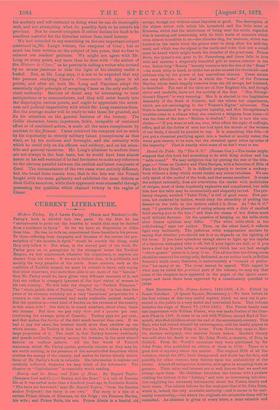Beauty and the Beast, and Tales of Home. By Bayard
Taylor. (Sampson Low and Co.)—" Beauty and the Beast" is a tale of Russian life as it was rather more than a hundred years ago in Southern Russia. "The facts are borrowed," says Mr. Bayard Taylor, "from the Russian author Petjesski ; the fancy is our own." The story is a tale of a certain Prince Alexis, of Kinesma, on the Volga ; the Princess Martha, his wile ; and Prince Boris, his son. Prince Alexis is a fearful old savage, though not without some impulses to good. The description of the abject terror with which his household and the little town of Kinesma, which had the misfortune of being near his castle, regarded him is amusing and interesting, with its little traits of manners which seem almost incredible to us—the slumber-flag, for instance, which was hoisted on the castle when the prince went to sleep after his mid-day meal, and which was the signal to the castle and town that not a sound must be heard which might break the slumber of the great man. Prince Boris, the tyrant's son, goes to St. Petersburg, and there falls in love with and marries a singularly beautiful girl of station inferior to his own. Before long "Beauty "bravely ventures into the den of the "Beast" —he stood, whip in hand, to strike her as she crossed the threshold—and subdues him by the power of her marvellous charms. These scenes are very effective ; so is that in which the " wake " of the Princess Martha, whom death happily removes from the old savage, her husband, is described. The rest of the tales are of New England life, and though clever and readable, have not the novelty of the first. "Mrs. Strongi- tharm's Report" is very amusing. Mrs. S. is elected to the Legislative Assembly of the State of Atlantio, and she relates her experiences,. which are not encouraging to the "Women's Rights" advocates. The State is determined to give complete equality, and Mrs. Strongitharm's troubles come to a climax when she receives a telegram from home—it was the time of the war—" Melissa is drafted." This is how she con- cludes If you were to ask me, now, what effect the right of suffrage, office, and all the duties of men has had upon the morals of the women of our Stale, I should be puzzled to say. It is something like this,—if you put a chemical purifying agent into a bucket of muddy water, the water gets clearer, to be sure, but the chemical agent takes up some of the impurity." That is exactly what some of us don't want to see.


































 Previous page
Previous page